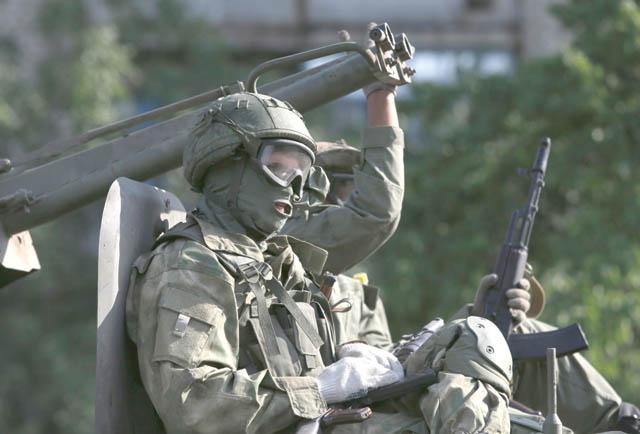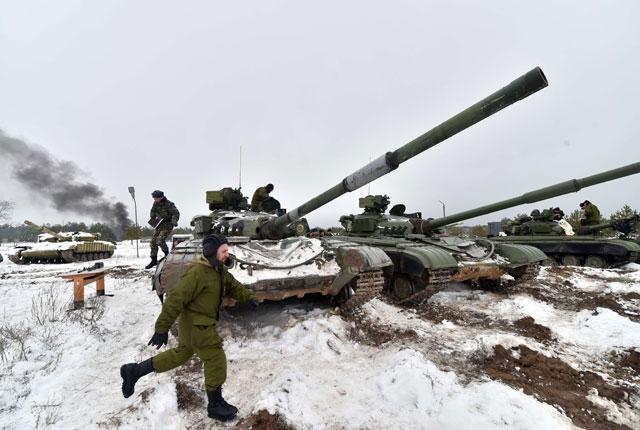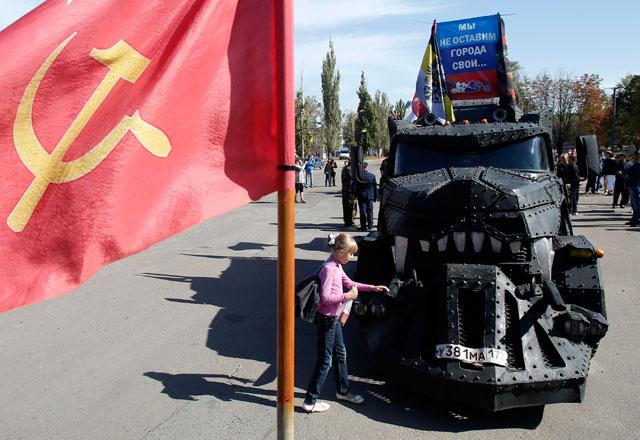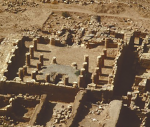You are here
Merkel says tightening Ukraine-Russia border is key to peace deal
By Reuters - Aug 23,2014 - Last updated at Aug 23,2014
KIEV — German Chancellor Angela Merkel said on Saturday the standoff over Ukraine could be solved but only if control was tightened over the Ukraine-Russia border across which, the West alleges, Russia has been funnelling arms to help a separatist rebellion.
Merkel was visiting Kiev as a prelude to a meeting next week between the Russian and Ukrainian leaders that diplomats say is the best chance in months of a peace deal in eastern Ukraine, where government forces are fighting pro-Moscow rebels.
She arrived as tensions flared up again. NATO has alleged Russia’s military is active inside Ukraine helping the rebels, and Moscow angered Kiev and its Western allies by sending an aid convoy into Ukraine against Kiev’s wishes.
“There must be two sides to be successful. You cannot achieve peace on your own. I hope the talks with Russia will lead to success,” Merkel said, looking ahead to the meeting on Tuesday involving Russian President Vladimir Putin and his Ukrainian counterpart Petro Poroshenko.
“The plans are on the table, about how you can achieve peace and good cooperation between the countries.
“Now actions must follow,” she told a news briefing.
She said the main obstacle was the lack of controls along the nearly 2,000km border. She proposed a deal between Kiev and Moscow on monitoring of the frontier by the Organisation for Security and Cooperation in Europe (OSCE).
“Now we need a two-sided ceasefire linked to a clear controlling of the Russian-Ukrainian border, otherwise peace won’t be achieved,” Merkel said.
Diplomats say Merkel came to Kiev with two objectives: Primarily to show support for Kiev but also to urge Poroshenko to be open to peace proposals when he meets Putin next week in the Belarus capital, Minsk.
Poroshenko, whose forces have been forcing the rebels to retreat, said Kiev had offered ceasefires before and they were flouted. He said no peace deal was worth sacrificing Ukraine’s territorial integrity, and placed the blame at Russia’s door.
“Ukraine is ready and capable of guaranteeing a peaceful settlement,” Poroshenko said. “What is stopping us are the foreign mercenaries. Take the people with guns out of our territory.... and peace in Ukraine will be quickly restored.”
Hours before Merkel’s plane landed in Kiev, there was heavy artillery bombardment in Donetsk, the main separatist stronghold on the east of Ukraine, near the border with Russia. Reuters reporters saw apartments destroyed and puddles of blood, where, according to residents, two civilians were killed.
Reuters photographer saw three dead bodies of civilians in the eastern part of Donetsk 7km from the centre after shelling in the afternoon.
Witnesses said the bodies belonged to a family which had run out of their home to take cover in a bomb shelter.
The unusually intense shelling may be part of a drive by government forces to achieve a breakthrough against the rebels in time for Ukrainian independence day, which falls on Sunday.
Truck convoy
The conflict in Ukraine has dragged Russian-Western relations to their lowest point since the Cold War and drawn trade sanctions that are hurting already-fragile economies in Europe and Russia.
A convoy of about 220 white-painted trucks rolled into Ukraine on Friday through a border crossing controlled by the rebels after days waiting for clearance.
Moscow said the trucks moved in without Kiev’s consent because civilians in areas under siege from Ukrainian government troops were in urgent need of food, water and other supplies. Kiev called the convoy a direct invasion, a stance echoed by NATO, the United States and European leaders.
The OSCE said its monitors on the border had counted all 227 vehicles that entered Ukraine in the convoy coming back out again into Russian territory.
A Ukrainian military spokesman said however that some of the trucks had been loading up production equipment from military plants in Ukraine. The spokesman, Andriy Lysenko, said the equipment was taken from the Topaz plant which makes Kolchuga, a type of radar system, and from a factory in Luhansk which produces firearms’ magazines.
In Brussels, NATO said it had reports of Russian troops engaging Kiev’s forces inside Ukraine —fuelling Western allegations that the Kremlin is behind the conflict in an effort to undermine the Western-leaning leadership in Kiev.
“Russian artillery support — both cross border and from within Ukraine -— is being employed against the Ukrainian armed forces,” said NATO spokeswoman Oana Lungescu.
A Ukrainian military spokesman in Kiev, Andriy Lysenko, said Ukrainian government forces were now coming under cross-border fire from Russia, using Grad and Uragan missiles, over a 400km length of the border.
The Russian foreign ministry called the allegations “groundless”. Russia accuses Kiev, with the backing of the West, of waging a war against innocent civilians in eastern Ukraine, a mainly Russian-speaking region.
The crisis over Ukraine started when mass protests in Kiev ousted a president who was close to Moscow, and installed leaders viewed with suspicion by the Kremlin because of their pro-Europe policies.
Soon after that, Russia annexed the Ukrainian region of Crimea, and a separatist rebellion broke out in eastern Ukraine. In the past weeks, the momentum has shifted towards Ukraine’s forces, who have been pushing back the rebels.
The separatists are now encircled in their two strongholds, Luhansk and Donetsk.
Reuters reporters in Donetsk said that most of the shelling was taking place in the outskirts, but explosions were also audible in the centre of the city.
Related Articles
Ukrainian forces have raised their national flag over a police station in the city of Luhansk which was for months under rebel control, Kiev said on Sunday, in what could be a breakthrough in Ukraine's efforts to crush pro-Moscow separatists.
Ferocious fighting raged in Ukraine on Saturday, threatening a ceasefire deal as Kiev and the US accused Russia of fuelling a rebel onslaught to grab territory hours before the truce began.
Heavy fighting erupted around the rebel stronghold of Donetsk in eastern Ukraine on Sunday, piling further pressure on a precarious nine-day-old truce between the government and separatist fighters.



















